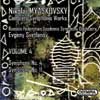Myaskovsky Complete Symphonic Works, Vol 4: Symphonies Nos 4 and 11
More from Miaskovsky‚ here with hints of Tchaikovsky‚ Rachmaninov and Bruckner
View record and artist detailsRecord and Artist Details
Composer or Director: Nikolay Myaskovsky
Genre:
Orchestral
Label: Olympia
Magazine Review Date: 5/2002
Media Format: CD or Download
Media Runtime: 77
Mastering:
Stereo
DDD
Catalogue Number: OCD734

Tracks:
| Composition | Artist Credit |
|---|---|
| Symphony No. 11 |
Nikolay Myaskovsky, Composer
Evgeni Svetlanov, Conductor Nikolay Myaskovsky, Composer Russian Federation Academic Symphony Orchestra |
| Symphony No 4 |
Nikolay Myaskovsky, Composer
Evgeni Svetlanov, Conductor Nikolay Myaskovsky, Composer Russian Federation Academic Symphony Orchestra |
Author:
With these fourth and fifth instalments of Olympia’s Miaskovsky cycle‚ the composer’s twintrack creative trajectory comes more clearly into focus. Alongside symphonies which trudge through boggy chromatic terrain en route to the pareddown and speculative idiom of No 13 (4/02)‚ we find him essaying the more traditional‚ Rimskyish brand of invention heard so affectingly in the Symphony No 25 (4/02). This melodic vein is present as early as the Fifth of 1918.
The Fifth was one of the scores that won Miaskovsky an international following in the years between the Wars‚ with performances in New York‚ Chicago and Philadelphia. Its highlights include the vernal opening‚ as fresh as early Scriabin‚ and a jolly‚ folkderived scherzo. The Franckian slitherings of the slow movement and the bloated apotheosis of the finale are perhaps more of an acquired taste. Nevertheless‚ if you respond to the sounds of Glazunov or Glière‚ this is similar‚ arguably classier stuff (for all that Prokofiev‚ Miaskovsky’s closest friend‚ was upset by its reactionary tendencies). For this work‚ Svetlanov’s orchestra boasts a more authentic timbre than Sir Edward Downes’s BBC Philharmonic‚ though whether this makes up for an evident shortage of rehearsal time is a moot point. Olympia’s recorded sound has the greater immediacy‚ only don’t expect the glossy Chandos production values with which you’ll be familiar if you are a fan of Glazunov or Glière’s music.
Svetlanov’s coupling is the Symphony No 12‚ originally touted as the Kolkhoz or ‘Collective Farm’ Symphony (193132) – a reminder of what RussianSoviet composers had to put up with even before the promulgation of Socialist Realism. Indeed‚ that nebulous doctrine was widely welcomed precisely because it ended the ascendency of a simpleminded proletarian faction vehemently opposed to ‘bourgeois’ symphonic development. While Miaskovsky feigned the required topicality‚ his musical response (in so far as one can detect one at all in this oldfashioned‚ threemovement piece) was to beef up the jollification quotient of the finale in a style more usually associated with British film scores of a slightly later date.
The companion disc pairs two symphonies selfconsciously worked from limited thematic means. The generally grim and resentful Fourth‚ unsurprisingly neglected on disc until now‚ was written back to back with the Fifth. Its dour atmosphere must have something to do with the recent horrors of the composer’s military career. The shades of Tchaikovsky’s Pathétique‚ Rachmaninov’s Second and Mahler’s Sixth are pressed into service‚ yet also remind one that there are less turgid ways to convey negative emotion. Symphony No 11 (1931) is generally lighter in texture‚ and‚ like the Fifth‚ will repay repeated listening. At its heart is an austere‚ deeply felt slow movement‚ at times curiously reminiscent of Sibelius‚ while wholly characteristic in its embrace of ‘elevated’ melodic ideas and an idiosyncratic fugato treatment for solo woodwind. The finale is a set of variationscumsonata movement. One idea anticipates the first of Rachmaninov’s Symphonic Dances (can such resemblances be purely coincidental or is there a common source?); another variant is positively Brucknerian. Variable‚ sometimes sketchy playing‚ but decent recording and detailed notes make this a series well worth following.
Discover the world's largest classical music catalogue with Presto Music.

Gramophone Digital Club
- Digital Edition
- Digital Archive
- Reviews Database
- Full website access
From £8.75 / month
Subscribe
Gramophone Full Club
- Print Edition
- Digital Edition
- Digital Archive
- Reviews Database
- Full website access
From £11.00 / month
Subscribe
If you are a library, university or other organisation that would be interested in an institutional subscription to Gramophone please click here for further information.




